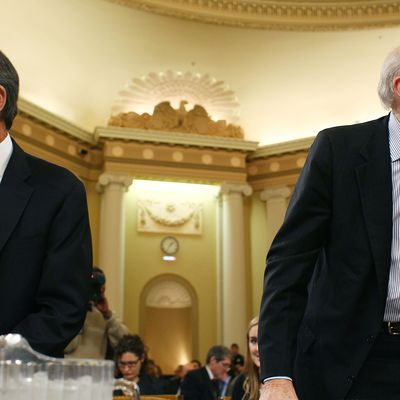
I’ve had plenty of good sport with Pete Peterson, the larger family of Pete Peterson–financed anti-deficit organizations, and various affiliated lobbyists thereto, but I think some of the liberal backlash against the deficit scold community is getting out of hand. Matthew Yglesias recently referred to Maya MacGuineas, a leading spokesperson for the Peterson network, as a “sociopath,” which seems unfair even when discounting for comic hyperbole. Paul Krugman has been archly noting that Fix the Debt, the most currently prominent Peterson group, asserts that lower tax rates are among its key fiscal principles.
That is certainly an odd principle for an anti-deficit organization to espouse. But it doesn’t prove the charge, floated by numerous liberals, that the deficit scolds are engaged in a pure scam designed to line the pockets of their corporate backers. It merely shows that the deficit scolds were attempting, ultimately without success, to create a consensus in the face of implacable hostility.
The budget deficit is neither the most important short-term political problem (that would be mass unemployment) nor the most important long-term problem (that would be climate change). But it is a problem, and the deficit scolds have at least been trying to solve it. Their efforts centered around the commission chaired by Erskine Bowles and Alan Simpson.
For two decades, the main impediment to controlling the long-term deficit has been the Republican Party’s fanatical hatred of taxes on the rich. Bowles, Simpson, et al didn’t really solve that problem. What they found is that they could get Republicans to agree to higher tax revenue in theory if it was delivered in the form of an overhauled tax code, with fewer deductions and lower rates.
The trouble was, the deficit scolds were so eager to get to yes they took a broad theoretical agreement on tax reform and presented it as a specific, credible plan to increase tax revenue. But the Bowles-Simpson “plan” is really just a series of options for tax reform. Making the numbers work would require huge reforms like ending the preference for capital gains, which is a great idea but will never pass Congress, or ending the charitable tax deduction, which is a bad idea and will also never pass Congress.
That’s the core problem with Bowles-Simpson: It’s a delusional belief that a theoretical agreement for tax reform that lowers rates and ends deductions would translate into a real plan. The fiscal scolds cling to this because the tax reform alchemy is the whole thing that makes their plan appear to work. That’s why the Peterson network proclaims that lower tax rates are a key principle for tax reform – they think this will produce Republican votes for more revenue, even though it won’t. The only way to get Republicans to agree to higher revenue was to maneuver them into a situation where they had no choice — which is what is happening now.
So the deficit scolds may be deluded, but they’re not venal. Many of the business types associated with the deficit scold community are genuinely willing to pay higher taxes as part of a long-term deficit agreement. Indeed, as the negotiations have proceeded and President Obama has made clear that higher rates must be part of the final bill, numerous CEOs associated with the deficit scolds have declared their support.
Liberals may disagree with the priorities of the deficit scolds, but the main goal they say they’re after — reducing the long-term budget deficit through a mix of higher revenue and lower spending on social insurance — really is what they’re after.






























